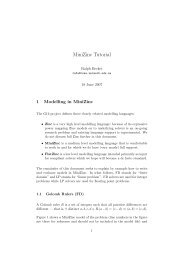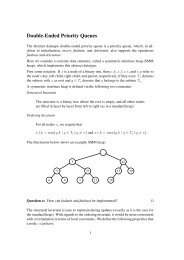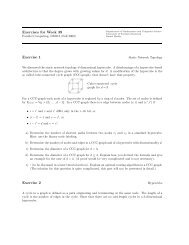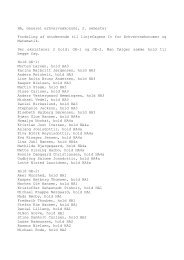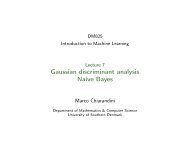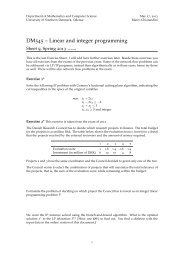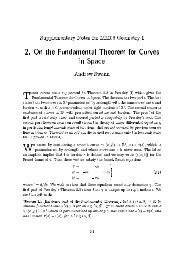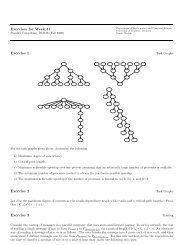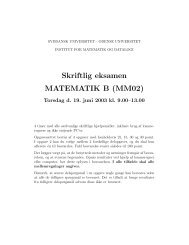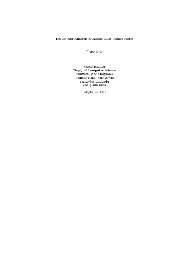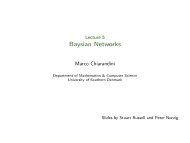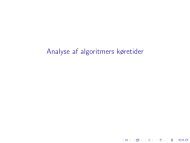Projekt 4. - Institut for Matematik og Datalogi - Syddansk Universitet
Projekt 4. - Institut for Matematik og Datalogi - Syddansk Universitet
Projekt 4. - Institut for Matematik og Datalogi - Syddansk Universitet
You also want an ePaper? Increase the reach of your titles
YUMPU automatically turns print PDFs into web optimized ePapers that Google loves.
N a t u r v i d e n s k a b e l i g t P r o j e k t / F a r m a c e u t : V a l g f r i t P r o j e k t<br />
<strong>Projekt</strong> 51. Online Stock-trading Game<br />
Vejleder: Abyayananda Maiti, abyaym@imada.sdu.dk<br />
<strong>Institut</strong>: <strong>Institut</strong> <strong>for</strong> <strong>Matematik</strong> <strong>og</strong> Datal<strong>og</strong>i (IMADA)<br />
Praktisk del: <strong>Projekt</strong>et er teoretisk datal<strong>og</strong>i<br />
Gruppeplacering: IMADA<br />
Gruppestørrelse: Mindst 3 <strong>og</strong> max 5 deltagere. Én gruppe kan arbejde med projektet.<br />
Kommentarer: <strong>Projekt</strong>et er særligt velegnet til studieordning i datal<strong>og</strong>i / The project is specially<br />
suitable <strong>for</strong> students with curriculum in computer<br />
Keywords:<br />
Online algorithm, Stock market, One-way trading, Two- way trading, Game<br />
theory<br />
Abstract<br />
In computer science, an online algorithm is one that can process its input piece-by-piece in a serial<br />
fashion, i.e., in the order that the input is fed to the algorithm, without having the entire input<br />
available from the start. In contrast, an offline algorithm is given the whole problem data from<br />
the beginning and is required to output an answer which solves the problem at hand. (For example,<br />
selection sort requires that the entire list be given be<strong>for</strong>e it can sort it, while insertion sort<br />
doesn't.)<br />
Financial problems are typically online in nature because its in<strong>for</strong>mation about the future is often<br />
scarce and/or unreliable. Specifically, stock trading is a very important financial process and also<br />
very well known to general people who may not have any proper knowledge of financial theories.<br />
From the online algorithm perspective, there are two types of trading: One-way trading and<br />
Two-way trading.<br />
Here we will develop a stock-trading game where players have to place their moves in online<br />
fashion and virtual adversary (e.g. computer) may take different strategies to manipulate the upcoming<br />
stock-prices. Initially player would be given a fixed amount of money using which<br />
he/she has to trade in the stock market. For one way trading, trader only can buy and in two-way<br />
trading, trader can do any combinations of buy and sell. At each time step adversary will quote<br />
prices <strong>for</strong> each stock. The goal would be to maximize the profit. We will also figure out different<br />
bounds on profits in different scenarios (mainly different types of adversary).<br />
The basic version of game will deals with only one stock. We can extend it to general case where<br />
traders can buy and sell multiple stocks.<br />
Minikurser<br />
Obligatorisk: <strong>Projekt</strong>arbejde (LaTeX).<br />
Anbefalede: Ingen<br />
Litteraturliste over metode artikler, som udleveres til de studerende<br />
1. Borodin, A.; El-Yaniv, R. (1998). Online Computation and Competitive Analysis. Cambridge<br />
University Press. ISBN 0-521-56392-5 (Chapter 14).<br />
2. R. El-Yaniv, A. Fiat, R.M. Karp, and G. Turpin (2001). Optimal Search and One-Way Trading<br />
Online Algorithms, Algorithmica, 30, 101-139.<br />
3. c<strong>og</strong>prints.org/6216/2/SSRN-id1270025.doc<br />
53



